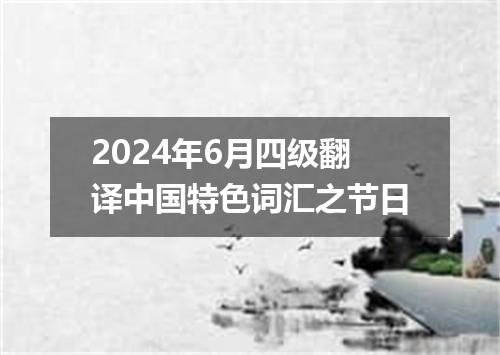2024年6月四级翻译中国特色词汇之节日
推荐文章

在四级翻译中,通常会涉及到传统文化、历史事件、社会现象的翻译,这样要求考生深入理解中华文化,并灵活运用目标语言表达。准确翻译这些词汇,不仅需要语言技能,还需对中西方文化差异有深刻把握。
1. 国庆节 National Day
National Day is celebrated on October 1st each year to mark the founding of the People's Republic of China.
国庆节每年10月1日庆祝,以纪念中华人民共和国的成立。
2. 中秋节 Mid-Autumn Day/Festival
The Mid-Autumn Festival, also known as the Moon Festival, is a time for families to gather and enjoy mooncakes.
中秋节,又称月圆节,是家人聚在一起享受月饼的时候。
3. 春节 Spring Festival
The Spring Festival, or Chinese New Year, is the most important traditional holiday in China, marked by fireworks, dragon dances, and family reunions.
春节,或中国新年,是中国最重要的传统节日,以烟花、舞龙和家庭团聚为特色。
4. 元宵节 Lantern Festival
The Lantern Festival, held on the 15th day of the first lunar month, concludes the Chinese New Year celebrations with lantern displays and riddle games.
元宵节在农历正月十五举行,以灯笼展示和猜谜游戏结束春节庆祝活动。
5. 儿童节 Children’s Day
Children's Day is celebrated on June 1st each year, focusing on the happiness and well-being of children.
儿童节每年6月1日庆祝,关注儿童的快乐和福祉。
6. 端午节 Dragon Boat Festival
The Dragon Boat Festival, commemorating the death of the poet Qu Yuan, is marked by dragon boat races and the eating of zongzi.
端午节是为了纪念诗人屈原而设立的,以龙舟赛和吃粽子为特色。
7. 妇女节 Women’s Day
International Women's Day, celebrated on March 8th, is a global day recognizing the social, economic, cultural, and political achievements of women.
国际妇女节在3月8日庆祝,是全球范围内认可妇女在社会、经济、文化和政治成就的日子。
8. 泼水节 Water-Splashing Day
The Water-Splashing festival is a traditional festival of the Dai people in Yunnan, China, where people splash water on each other as a symbol of good luck and purification.
泼水节是云南傣族的传统节日,人们相互泼水,作为好运和净化的象征。
9. 教师节 Teachers’ Day
Teachers' Day in China is celebrated on September 10th each year, honoring the contributions of teachers to society.
中国的教师节每年9月10日庆祝,表彰教师对社会的贡献。
10. 五四青年节 Youth Day
Youth Day, celebrated on May 4th, commemorates the 1919 Movement, which was a patriotic protest by Chinese students against foreign influence.
五四青年节在5月4日庆祝,纪念1919年的运动,这是中国学生对外国影响的爱国抗议。
11. 舞狮子 Lion Dance
Lion Dance is a traditional Chinese performance where performers wear a lion costume and mimic the movements of a lion, often performed during festivals and celebrations.
舞狮子是一种传统的中国表演,表演者穿着狮子服装,模仿狮子的动作,通常在节日和庆祝活动中表演。
12. 闹花灯 Flower Lantern Festival
Flower Lantern Festival, also known as Lantern Festival, is a traditional Chinese festival celebrating the first full moon of the lunar year, with the display of various colorful lanterns.
闹花灯节,也称为元宵节,是庆祝农历新年的第一个满月的传统中国节日,展示了各种彩色的灯笼。
13. 吃元宵 Eating Tangyuan
Eating Tangyuan is a custom during the Lantern Festival, where families enjoy sweet rice balls made of glutinous rice flour, often filled with black sesame or red bean paste.
吃元宵是元宵节期间的习俗,家人享用由糯米粉制成的甜糯米球,通常填充有黑芝麻或红豆沙。
14. 拜年 Visiting Relatives and Friends
Visiting relatives and friends is a common practice during the Spring Festival, symbolizing the beginning of a new year and the renewal of relationships.
拜年是春节期间的一种常见做法,象征着新年的开始和关系的更新。
15. 年夜饭 Family Reunion Dinner
Family Reunion Dinner, also known as the New Year's Eve Dinner, is a special meal shared by families on the eve of the Spring Festival, filled with traditional Chinese dishes.
年夜饭,也称为除夕夜饭,是春节期间家庭在除夕夜共享的特别晚餐,充满了传统的中国菜肴。
16. 贴春联 Spring Festival Couplets
Spring Festival Couplets are red banners with poetic couplets written on them, often placed on doors during the Spring Festival to bring good luck and prosperity.
春联是春节期间放在门上的红色横幅,上面写着诗意的对联,以带来好运和繁荣。
17. 踏青 Treading on the Green
Treading on the Green is a custom during the Qingming Festival, where people visit parks and countryside areas to enjoy the spring scenery and fly kites.
踏青是清明节的习俗,人们去公园和乡村地区欣赏春天的景色,放风筝。
18. 清明扫墓 Qingming Tomb-Sweeping Day
Qingming Tomb-Sweeping Day is a traditional Chinese festival for honoring ancestors and cleaning their graves, held on April 4th or 5th each year.
清明扫墓节是中国传统的节日,用于纪念祖先并清理他们的坟墓,每年4月4日或5日举行。
19. 拴五色丝线 Wearing Five-Color Threads
Wearing Five-Color Threads is a custom during the Duanwu Festival, where children tie five-color threads around their wrists to ward off evil spirits.
拴五色丝线是端午节期间的习俗,孩子们在手腕上系上五色丝线,以驱赶邪恶的灵魂。
20. 祭祖 Ancestor Worship
Ancestor Worship is a common practice in Chinese culture, where people honor their ancestors by offering sacrifices, burning incense, and praying for blessings.
祭祖是中国文化中的一种常见做法,人们通过献祭、烧香和祈祷来尊敬他们的祖先。
21. 赏菊 Appreciating Chrysanthemums
Appreciating Chrysanthemums is a custom during the Double Ninth Festival, also known as the Chrysanthemum Festival, where people admire the beauty of chrysanthemums and enjoy outdoor activities.
赏菊是重阳节期间的一种习俗,也称为菊花节,人们欣赏菊花的美丽,享受户外活动。
22. 重阳节 Double Ninth Festival
Double Ninth Festival, also known as the Chrysanthemum Festival, is a traditional Chinese festival celebrated on the 9th day of the 9th lunar month, emphasizing respect for the elderly and enjoying the autumn scenery.
重阳节,也称为菊花节,是中国传统节日,农历九月初九庆祝,强调尊敬老人和享受秋天的景色。
